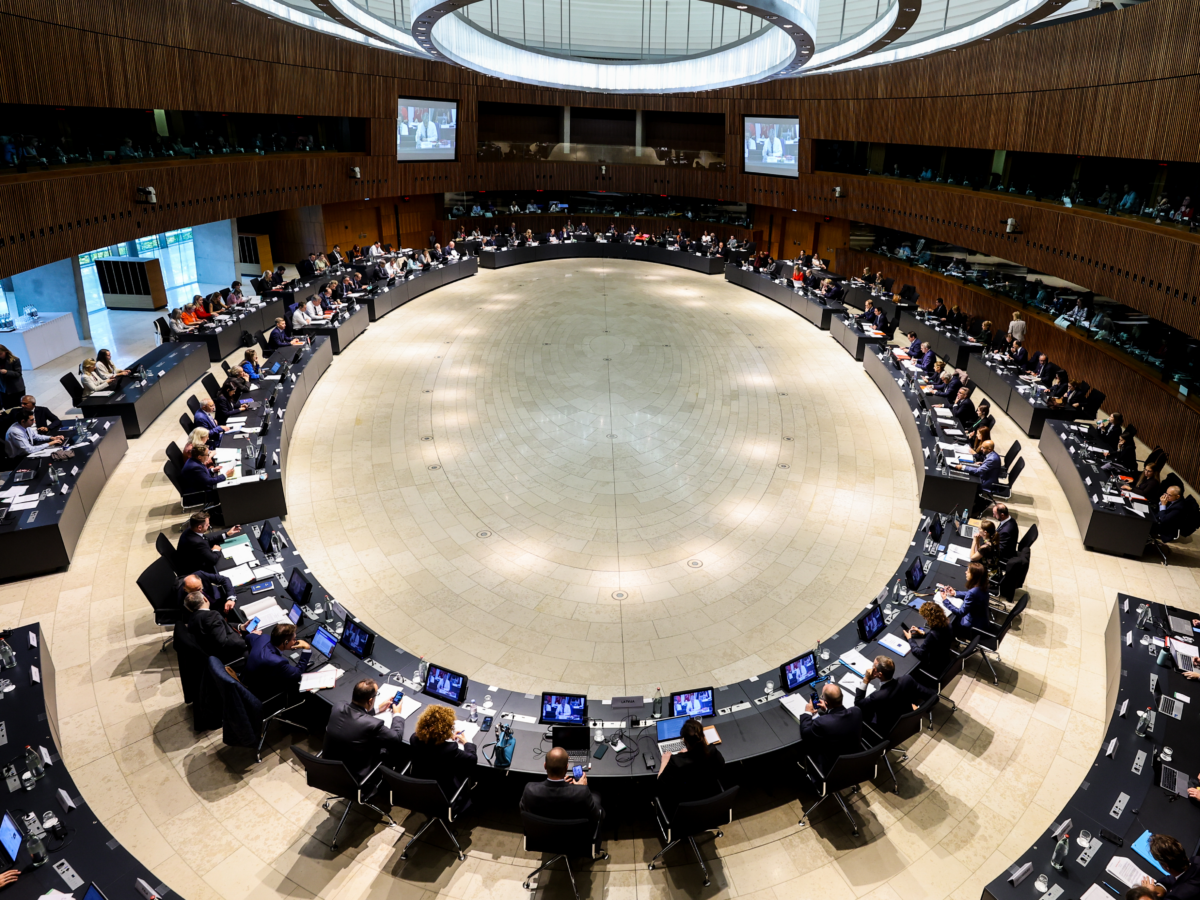
Demonstrating leadership on climate and environmental issues: Minister Serge Wilmes at the Environment Council of the European Union in Luxembourg
The Minister for the Environment, Climate and Biodiversity, Serge Wilmes, took part in the meeting of the European Union's Environment Council in Luxembourg on 21 October 2025. On the agenda were discussions and decisions concerning the preparation of the 30e United Nations Climate Change Conference (COP 30), the European strategy for water resilience, and an exchange of views on the European Ocean Pact.
Conference on climate change (COP 30)
On the first point, the environment ministers of the European Union (EU) adopted conclusions on the preparation of the 30e United Nations Climate Change Conference (COP 30), to be held in Belém, Brazil, from 10 to 21 November 2025. These conclusions will constitute the EU's general negotiating position at COP 30. To complete this mandate, the adoption of the EU's 2040 climate target and the update of the EU's Nationally Determined Contribution (NDC) under the Paris Agreement, which will inform the EU's climate ambition for 2035, are on the agenda for the additional Environment Council on 4 November 2025.
In his speech, Minister Serge Wilmes regretted that it was not possible, at this stage, to refer in these conclusions to the long-awaited EU CND.
«In the current context, it is essential for the European Union to show leadership on climate and environmental issues, one of the few areas in which the Union continues to be perceived as a leader. But to assume this role, Europe needs credibility and legitimacy in these matters. To do this, we need to listen to science, which is very clear about the 2040 target. I would like to take this opportunity to reiterate that it is essential for Luxembourg that the two dossiers - the contribution determined at national level and the target for 2040 - remain closely linked»said the Minister.
In terms of alliances, the Minister recalled, among other things, the importance of securing the support of vulnerable countries, the African group and the least developed countries, which in principle share the same cause as us.
Strategy for resilience in the water sector
The ministers then approved the conclusions on the European strategy for resilience in the water sector. «The responsibility for achieving good status can never rest with the water sector alone. It is crucial that all the sectors concerned - health, the economy, industry and agriculture to name but a few - assume their role and their responsibilities. Water resilience must become a cross-cutting component of public policy, including funding and competitiveness», insisted Minister Serge Wilmes in his speech.
«We need a coherent approach at European level to meet the ambitions of achieving good status for all bodies of water. The problem of PFAS, and TFA in particular, cannot be resolved at national level alone. A solution at source is essential.»
(Serge Wilmes)
In Luxembourg, a national water strategy will be implemented. In addition, the Ministry of the Environment, Climate and Biodiversity will engage in a broad and ongoing dialogue with stakeholders as part of the preparation of the 4e management plan to be drawn up under the Water Framework Directive. In November, a national «Renaturéierungs-Dësch» round table will be held to speed up the implementation of river renaturation projects. We will be participating in the structured dialogue with the European Commission with great interest and motivation.
Support for ambitious ocean governance
During the discussion on ocean governance, Luxembourg reaffirmed its commitment to protecting the oceans, which are essential for climate regulation and global food security. With this in mind, Luxembourg supports an integrated «source to sea» approach to combat marine pollution, which often comes from land-based sources.
State of play of the EU regulation on deforestation
With regard to the implementation of this instrument to combat deforestation, Luxembourg stresses the crucial importance of resolving IT problems in order to avoid any unnecessary administrative burden.
At the same time, Luxembourg is calling for the regulation to be simplified, particularly for small producers operating in areas not affected by deforestation. To this end, Luxembourg is advocating a two-stage approach: postponement of the application of the regulation until the technical problems have been resolved, followed by an in-depth analysis of the possibilities for simplification.
Aware of the urgency of climate change and the importance of the climate-biodiversity-economy nexus, Luxembourg reaffirms its support for this instrument, which is essential not only to protect European consumers against greenwashing, but also to guarantee the competitiveness of our producers in the face of imports that do not meet the same standards. While Luxembourg is in favour of administrative simplification, it is firmly opposed to any deregulation or abolition of the regulation, calling for effective implementation that is adapted to the needs of small producers.
Luxembourg insists on continued funding for LIFE activities under the future Multiannual Financial Framework (MFF)
Furthermore, as part of the discussions on the 2028 MFF, Minister Serge Wilmes expressed his disappointment at the abolition of the LIFE programme, which is recognised for its concrete results in protecting the environment, climate and biodiversity. LIFE is a key tool for European environmental policies in the current MFF.
The Minister stressed the need to continue the programme's activities, even without its current format, and the importance of integrating clear environmental objectives, with criteria and monitoring mechanisms, into all financial instruments.
Revision of European legislation on chemicals
Finally, during an exchange on the future revision of European legislation on chemicals, Minister Serge Wilmes stressed that the protection of human health and the environment must remain at the heart of this reform.
Luxembourg believes that this revision should not be limited to technical simplification. It must constitute a genuine modernisation of the regulatory framework, to make it more effective, more coherent and better adapted to today's challenges. An additional meeting of the EU Environment Council will be held on 4 November 2025.

